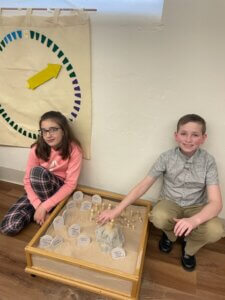Godly Play at Trinity, Fredonia Sparks Collaboration

It’s a constant challenge for Sunday School teachers: how do you keep kids engaged when the demands of school, sports, and parents’ work schedules mean that many families don’t attend church every week?
At Trinity, Fredonia, the answer since 2018 has been Godly Play, a formation program for children that can work especially well for congregations with a wide age range of children and varying attendance patterns. The program, says Wendy Schumacher, the partnership diocese’s missioner for children and youth, “is a great way of engaging participants in bible stories. It doesn’t have to be sequential if participants can’t be there every week, as the stories are seasonal and not lectionary-based.”
Godly Play was started about forty years ago by the Rev. Jerome Berryman, now a priest in the Diocese of Colorado. The program, which uses methods similar to Montessori schools, takes place in classrooms set up with spaces for children to hear and see bible stories acted out with wooden figures, scraps of cloth, boxes of sand and other tools. Children are encouraged to ask questions about the stories they hear starting with, “I wonder,” which has become the program’s hallmark phrase.
When church buildings emptied out during the pandemic, Janeil Rey, ministry coordinator for Sunday School at Trinity, Fredonia, used the opportunity to update their Sunday School space. As she cleaned out closets and classrooms, she realized that one of the things she most appreciated about Godly Play is that “it’s not a box of stuff arriving every quarter.”
The congregation has a strong history of supporting its Sunday School program, and Godly Play has been no exception. Retired teachers and volunteers with woodworking skills have contributed “artifacts,” the items used to tell the biblical story in each Godly Play session, while others have provided memorial funds to add to the parish collection.
“As Christians, we have a special obligation for Sunday School to be a loving place, welcoming and inviting,” Rey says. “Godly Play provides a loose structure within which to create that culture and environment. I wish my children had benefited from this when they were younger. Godly Play is timeless and authentic. The children know that each week, we’re going to spend time hearing the stories and talking about our relationship with God.”
In 2021, Canon Twila Smith accompanied Bishop Sean Rowe to Trinity, Fredonia for a visitation and saw the parish’s Godly Play program in action.
“That was an exciting impetus for the conversation about what Godly Play could mean to other churches,” she says. “It is an adaptable program, working with groups of different sizes and age groups, including groups with sporadic attendance patterns. There are the physical artifacts for those who are more concrete learners, opportunity for quiet and reflection for those who are drawn to those experiences, and more.”
Smith, who had experience with Godly Play before being called to the partnership dioceses, helped organize a four-person team to attend a Godly Play training in Kane, Pennsylvania, in March 2022. The partnership dioceses provided financial support for the team to attend, and on returning home, they began talking about how to share ideas, curriculum, and “artifacts.”
Ginny Becker, a member of Trinity, attended the training. While she was new to Godly Play, as an elementary school teacher, she was familiar with the Montessori educational theories and practices on which the program is based.
“I like the way Godly Play leads children to make their own conclusions, to think about what the [biblical] story means to them. The whole layout allows a child to move from the Sunday School setting into corporate worship seamlessly. Having been in a variety of Christian education situations throughout my life, I think this is a great way to go.
“What I didn’t anticipate at the training, being a seasoned teacher and workshop attendee, was that I would come away with a deeper understand of the Sacred Story and of the liturgical action of Holy Eucharist as an adult,” she says.
Shortly after the team returned from Godly Play training, the partnership dioceses hosted a Saturday retreat at Trinity, Fredonia titled “Creating Space for Children,” led by the Rev. Anne Kitch, rector of St Luke’s Episcopal Church in Phillipsburg, New Jersey and author of several books on children and family formation. Kitch’s presentation expanded interest in Godly Play and the retreat helped build a network of teachers using the program.
To foster collaboration, the partnership dioceses have purchased both the Godly Play curricula and a set of patterns for making the Godly Play materials, which include wooden figures that represent biblical characters, fabric shapes that represent lakes and rivers, and a small sand box for desert-based stories. Congregations that would like to share the curricula and patterns can email Schumacher.
The next opportunity for Godly Play Core Training, the program’ most comprehensive training session, will be March 24 through March 26 at St. Paul’s, Mt Lebanon in the Diocese of Pittsburgh. Learn more and register online.

